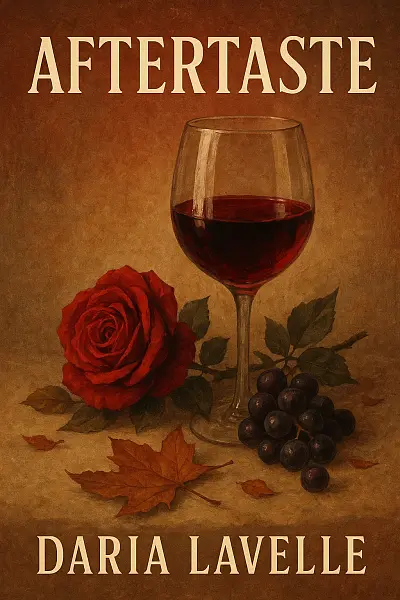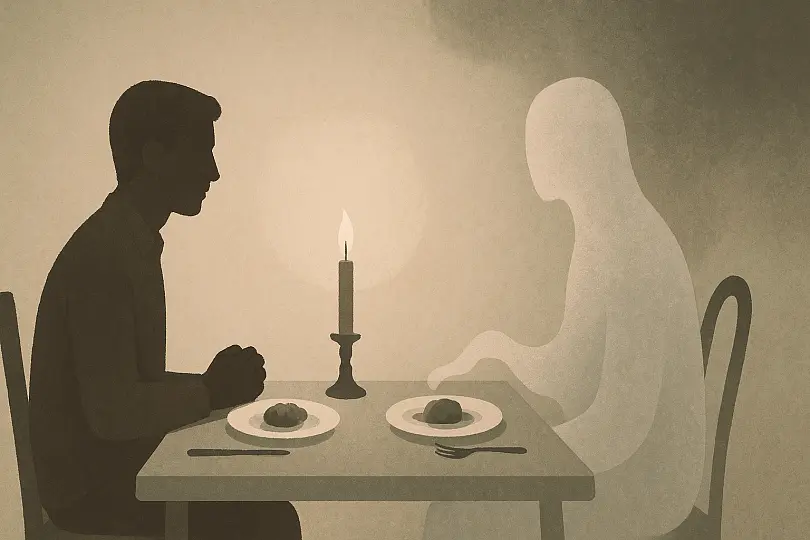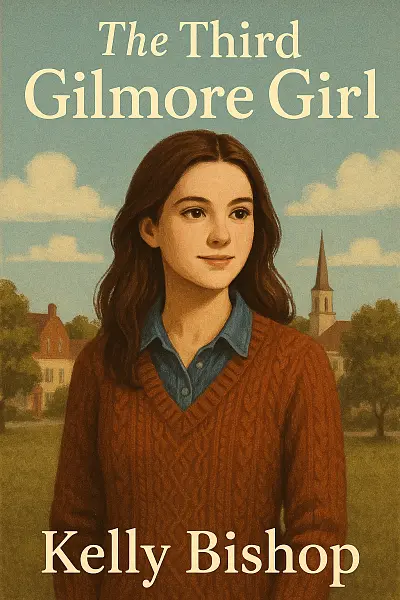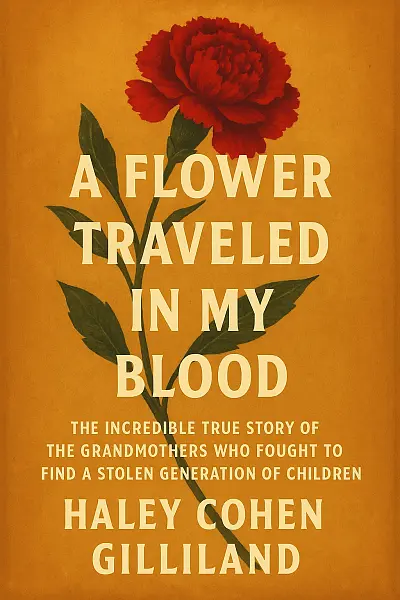
Aftertaste
by: Daria Lavelle
Konstantin “Kostya” Duhovny navigates the chaotic energy of New York’s restaurant scene, secretly haunted by ghosts he can’t see but whose favorite foods he compulsively tastes. Life is a blur of kitchens and loss until one strange night, a rush of otherworldly flavor leads him to realize he can reunite the living and dead through dishes he creates—a miracle that stirs up hope, longing, and danger.
Driven to ease others’ grief, Kostya takes his cooking into the high-stakes world of Manhattan’s culinary elite, risking everything for the chance to offer closure. But as his gifts attract attention and love unexpectedly stirs, he’s forced to face how much satisfaction is ever enough—and whether what he’s serving is healing or harm.
With wry humor and a layer of bittersweet magic, Aftertaste simmers with questions of love, loss, and how far we’ll go to fill the hungriest parts of our hearts. Will Kostya’s culinary powers finally bring him peace, or tear apart everything he cares about?
"“The flavors we carry linger longer than any meal—reminding us that healing, like taste, is layered and slow.”"
Let's Break This Down
The Author's Voice
Atmosphere
Rich, textured, and immersive—Lavelle’s world feels both familiar and decadently mysterious. The setting simmers with sensory detail: buzzing kitchens, clinking silverware, and the sharp tang of ambition hang in the air. There's a palpable tension, with every scene layered in emotion and possibility. Expect environments that linger on the palate, almost as if you could taste the air.
Prose Style
Lush, evocative, and unafraid of flavor. Lavelle writes in vibrant strokes—her language is playful yet precise, equally adept at capturing raw vulnerability and biting wit. Dialogue snaps and sizzles, while interior monologues delve deep and honest. Lavelle makes clever use of food-related metaphors, sprinkling them seamlessly throughout without overindulgence. The tone manages to be both tender and sharp, reflective yet brisk.
Pacing
Unhurried but never sluggish. The narrative unfolds like a leisurely meal—you’re invited to savor each course, from simmering conflicts to rich backstories. The plot is not about racing to dessert; instead, it favors a slow burn, drawing you deep into the protagonist’s inner world before ramping up to moments of drama. Expect contemplative chapters punctuated by bursts of intensity, especially in high-stakes kitchen scenes and emotional confrontations.
Character Voice
Authentic, nuanced, and savory. The protagonist’s perspective is immediate and relatable, full of sharp self-awareness and hesitant hope. Supporting characters pop with distinct quirks and flaws, creating a vibrant ensemble. Lavelle is adept at revealing character through action and dialogue, ensuring even minor figures leave an impression.
Mood & Feel
Bittersweet, quietly intense, and full of appetite for life. This is a story with a strong emotional current running beneath the surface—anticipate moments that sting, scenes that soothe, and an overall vibe that balances nostalgia with the hunger to move forward. Readers will feel both the ache and the anticipation of starting over.
If you love stories marinated in sensory detail, slow-burn relationships, and honest explorations of messy emotions, Aftertaste will serve up exactly the literary flavor you're craving.
Key Moments
-
Biting humor meets bittersweet nostalgia in every not-quite-love letter to home-cooked meals
-
The dinner party meltdown scene—equal parts chaos and confession—will leave you breathless
-
Culinary metaphors simmer alongside raw conversations about loss, longing, and second chances
-
Monica’s late-night kitchen monologue is pure gold—awkward, hilarious, and heartbreakingly true
-
Unforgettable side characters: grandma’s stubborn wisdom, best friend’s sharp one-liners, the ex who won’t quite leave
-
Messy, sensory-rich writing style—you can practically smell the burnt toast and feel the tension crackle
-
Underneath the laughter, a whisper of regret and hope lingers in every chapter
Plot Summary
From the opening chapters, Aftertaste whisks us into the hectic world of chef Simone Martin, whose culinary dreams unravel when her marriage to renowned food critic David abruptly ends. Reeling from betrayal and professional fallout, Simone moves back to her small hometown, hoping to rebuild her life. Throughout the novel, Simone battles family secrets and grapples with a competitive new restaurant venture—only to discover that her estranged mother, Iris, is hiding a terminal illness. The emotional climax hits when Simone must decide between reclaiming her old dreams or forging a new path rooted in forgiveness and self-worth. By the end, Simone finds acceptance and a renewed sense of belonging, reconciled with her family and passionate about her future.
Character Analysis
Simone is a brilliantly layered protagonist—vulnerable yet resilient, her arc moves from humiliation and anger to understanding and hope. Her ex-husband David is more than just an antagonist; he’s a catalyst for Simone’s transformation, embodying the narcissism and ambition that Simone learns to shed. Iris, the ailing mother, is tragic yet redemptive, and her journey from coldness to vulnerably connecting with Simone is especially moving. Secondary characters—like Simone’s quirky best friend Leah and rival chef Marcus—add flavor and depth, challenging Simone and supporting her at key turning points.
Major Themes
A big theme is reinvention after loss: Simone’s journey shows how setbacks can spark true self-discovery, especially as she navigates career failure and family complications. Another key thread is the complexity of forgiveness—the struggles between Simone and her mother underscore how healing comes from facing harsh truths and letting go of grudges. Food itself acts as a symbol of memory, tradition, and identity; for Simone, every dish ties her to past pain and new beginnings. The book also investigates gender and ambition, exploring the cost for women who dare to dream big in competitive industries.
Literary Techniques & Style
Daria Lavelle’s prose is lively, laced with sensory-rich descriptions that make every meal leap off the page. The narration blends third-person with moments of intimate inner monologue, letting us inhabit Simone’s anxieties, longings, and occasional bursts of humor. Metaphors about food and taste pop up throughout—burnt sugar for regret, a perfect soufflé for hope. Lavelle uses flashbacks artfully, layering family history with present-time dilemmas, while dialogue brings authenticity and warmth to character interactions.
Historical/Cultural Context
Set in contemporary America, the novel taps into the current fascination with foodie culture, celebrity chefs, and the pressure-cooker atmosphere of the restaurant business. Issues like the #MeToo movement and the evolving role of women in the workplace inform Simone’s journey, and the small-town setting highlights tensions between tradition and innovation. The story also gently touches on generational divides and modern family dynamics.
Critical Significance & Impact
Aftertaste has been widely embraced for its honest, heartwarming portrayal of reinvention and resilience, resonating strongly with readers seeking hope after hardship. Its nuanced exploration of women’s ambition in the culinary world adds to conversations about representation and equity. The novel’s emotional depth and memorable characters ensure its relevance for both personal enjoyment and classroom discussion—making it a modern favorite for those who love stories about food, family, and second chances.

A flavorsome journey of self-discovery, seasoned with dark secrets
What Readers Are Saying
Right for You If
If you’re the kind of reader who gets hooked by messy, complex characters and all the flavor-packed drama of foodie fiction, Aftertaste is probably right up your alley! 🍷🍇 If you devoured books like Sweetbitter or Kitchen Confidential, and you love stories about finding your way through tough times, you’re going to totally vibe with this one.
- Love books about self-discovery, second chances, and starting over? You’ll totally connect with Miriam’s journey—it’s raw, honest, and sometimes even a little spicy (in all senses).
- If you’re obsessed with novels set in the world of restaurants, wine, or culinary arts, the vivid atmosphere here delivers all that behind-the-scenes goodness that makes you want to pour yourself a glass while you read.
- Fans of imperfect, relatable women navigating real-life messes (think Tembi Locke or Gabrielle Zevin characters) will absolutely click with this one—especially if you appreciate a little bitterness mixed with the sweet.
But hey, if you’re all about fast-paced plots, action-packed chapters, or fluffy romantic comedies, this might not be your jam. The pacing is more simmer than boil, and it leans literary and introspective—lots of heartache, healing, and some tough self-reflection.
- If you need your books wrapped up neat with happy endings, or if you prefer reading to be a total escape from real-life messiness, you might find this one a bit heavy.
- And if you don’t enjoy food-centric novels or stories that dwell on mistakes and regrets, you might want to skip it.
Bottom line: If you crave richly flawed characters, love a foodie backdrop, and want a story about reinvention—this one will absolutely hit the spot. But if you just want light, breezy escapism or a super-speedy read, maybe try something else for now!
What You're Getting Into
In Aftertaste by Daria Lavelle, a fiercely ambitious chef is determined to reclaim her place at the top of the culinary scene after a very public setback, but the kitchen isn't the only place simmering with tension.
When her career collides with a complicated romance and unexpected betrayals, she must navigate rivalries and secrets both in and out of the restaurant, risking everything for a second chance.
With its blend of sharp humor, rich emotional layers, and mouthwatering descriptions, this book serves up a story that's as spicy, messy, and addictive as the dishes its heroine creates.
Characters You'll Meet
-
Willa Frank: The vibrant protagonist whose love for food and culinary ambition drive her journey towards self-discovery and healing after a devastating breakup.
-
Mallory Cates: Willa’s sharp-tongued best friend and confidante, offering both comic relief and heartfelt support as Willa rebuilds her life.
-
Reed Sorensen: The charming but emotionally guarded new love interest whose own vulnerabilities intertwine with Willa’s, challenging her to open up again.
-
Sam Walker: Willa’s ex-girlfriend whose sudden exit acts as the catalyst for Willa’s transformation, shaping much of the emotional landscape of the story.
-
Mrs. Lane: The wise, no-nonsense culinary mentor in Willa’s life, providing tough love and invaluable guidance as Willa navigates her personal and professional crossroads.
More Like This
For fans of rich, sensory-driven fiction, Aftertaste shares that same luscious attention to culinary detail found in Sweetbitter by Stephanie Danler—if you lost yourself in the behind-the-scenes drama of restaurant life and the messy, bittersweet growth of a young protagonist, you’ll find Lavelle’s world just as immersive and intoxicating. There’s also a dash of Emily Henry’s Beach Read here; both authors excel at blending sharp, witty banter with genuine emotional vulnerability, making you root for characters who are as complicated as your favorite comfort food.
On the screen, the emotional arcs and tangled relationships in Aftertaste might remind you of the acclaimed TV series The Bear. Both explore the chaotic, high-stakes world of professional kitchens, with a raw authenticity and a focus on imperfect characters learning to find meaning—and maybe even healing—through food and human connection. The show’s frenetic energy finds a quieter echo in Lavelle’s writing, but the heart and flavor profile are strikingly aligned.
Critic's Corner
What if the taste of memory was more than metaphor—what if every bite brought the dead just within reach? Aftertaste by Daria Lavelle plunges deep into the hunger we all harbor: for connection, for closure, for one impossible moment more. Against the backdrop of New York’s feverishly competitive restaurant scene, Lavelle spins a dazzling question: How far would we go to savor the ones we’ve lost, and at what cost to the living?
Lavelle’s prose is sharp, inventive, and occasionally hallucinatory—every sentence sizzles with flavor. She stirs sensory detail into nearly every line, wielding synesthesia not as gimmick but as texture, turning taste into a new language for grief. The choice to filter ghostly presences through food is both eerie and oddly intimate, each apparition arriving as a mysterious rush of flavor. Dialogue snaps with wit, and Lavelle has an assured hand with kitchen-culture banter, nailing the barely-restrained chaos of a working kitchen. Structurally, she juggles Kostya’s interior hauntings and the external high-octane world with remarkable finesse, pacing the narrative in bite-sized, satisfying courses. Though some descriptive indulgences occasionally slow the momentum—especially in the novel’s middle—the writing rarely feels self-indulgent, more often immersing us in Kostya’s synesthetic reality. Her narrative voice maintains a warmth, inviting the reader to pull up a seat and taste memory alongside the protagonist.
At its core, Aftertaste isn’t just about loss—it’s about what lingers. Lavelle peels away easy answers to grief and the afterlife, instead lingering on the compulsions that shape our lives: longing for lost parents, the ache of unfinished love, the lure of second chances, the risks we take to feed ourselves emotionally. The transactional magic of Kostya’s meals—each plate an uncanny reunion—forces a confrontation with the ethics of closure. Is there true consolation in a final goodbye, or only a perpetuation of longing? On another level, the novel skewers and celebrates kitchen hierarchy, exposing the secret tenderness beneath hardened chef exteriors. The book’s cultural specificity—the immigrant’s love letter to food, generational trauma wafting in with the steam—rings especially true now, when so many are reckoning with what and whom they’ve lost. Blending the comic and the tragic, Lavelle invites us to examine the boundaries between nourishment and obsession, comfort and compulsion.
Balancing its magical premise and urban grit, Aftertaste slyly nestles between TJ Klune’s tender, otherworldly comfort (think Under the Whispering Door) and the unsparing behind-the-scenes realism of Sweetbitter. What Lavelle’s debut brings uniquely to the table is its refusal to sentimentalize either food or grief, instead serving up an experience as bracing as a shot of vinegar—unexpected, invigorating, and deeply felt. Fans of contemporary fabulism or culinary fiction will find this an especially satisfying course.
If there’s a flaw to be found, it’s that the crescendo of magical stakes threatens to overshadow the delicate realism that is Lavelle’s strongest suit. A few supporting characters could have been seasoned more fully. Yet these are minor quibbles in a novel that masterfully blends bitterness and sweetness. Aftertaste is a feast for anyone who hungers for more from life, from love, from loss—and it lingers long after the last page.
Community Thoughts
Okay, so I legit can’t stop thinking about the dinner scene with Vera. The way Lavelle twisted everything with just a few lines? Instant goosebumps. I’m still not over how suddenly the whole vibe turned—brilliantly unsettling.
that SCENE where everything unravels over a cup of coffee? it will not leave me alone. I keep replaying that dialogue in my head at 2 am, questioning every little choice. daria lavelle got into my brain and refuses to leave.
okay but who let Daria Lavelle write characters like that? I legit stayed up till 3am thinking about Mara. her choices crawled into my dreams and just refused to leave. Aftertaste does not mess around with your peace.
Why did I stay up three nights in a row for Aftertaste? That damn scene in the kitchen where memory and longing collide. Couldn't shake it. The way Lavelle wrote that moment, it just kept echoing around in my head.
so I picked up Aftertaste by Daria Lavelle thinking it’d be a quick read but then I COULDN’T SLEEP because the way Cass kept replaying that rainy night in her mind just infected my own thoughts. seriously, i’m still unsettled.
Leave Your Review
Local Take
Why It Matters
Aftertaste by Daria Lavelle strikes a chord with readers here because it tackles identity, perseverance, and family legacy—themes super relevant in our culture. We’ve witnessed transitions and reckonings with the past, echoing local debates about generational change and reconciling tradition with modernity.
- The protagonist’s struggle balancing personal ambition with family expectations strongly mirrors the tension many experience between individual dreams and cultural duty.
- In scenes where hidden family secrets shape the present, it’s impossible not to think of our own history’s buried truths and the collective push for openness.
The book’s raw treatment of clashing values—old vs. new, self vs. society—directly resonates here, where similar issues fuel big conversations. Lavelle’s narrative style, with its intimate tone and nonlinear revelations, reminds me of contemporary local authors who blend confession and critique, challenging neat cultural narratives. It all feels familiar yet refreshingly unfiltered.
Food for Thought
Notable Achievement:
Aftertaste by Daria Lavelle has quickly captured a passionate readership for its witty storytelling and nuanced portrayal of modern relationships, earning praise for its clever dialogue and refreshing take on the complexities of love and self-discovery. This novel has become a book club favorite, sparking lively conversations about second chances and the bittersweet flavors of moving on.
Like what you see? Share it with other readers







